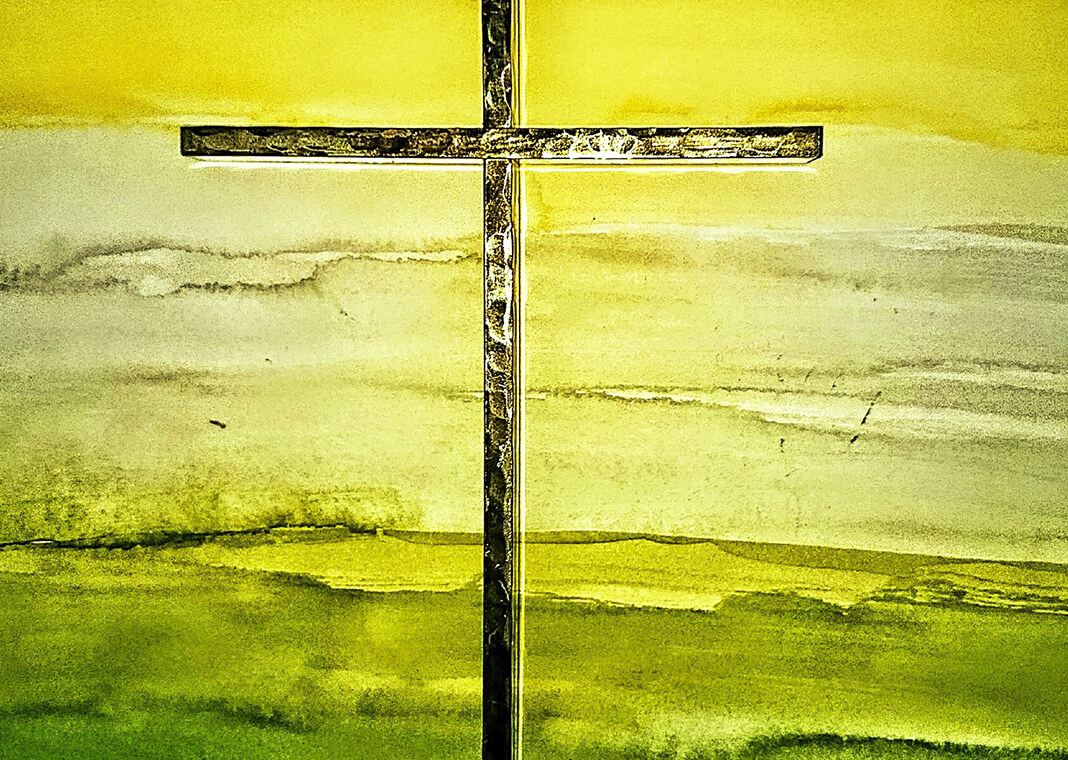
During a Mass for the Anointing of the Sick, the priest referred to the famous Caravaggio painting The Calling of St. Matthew. In it, Matthew sits at a table, surrounded by others, with a surprised look that Jesus is pointing directly at him. I imagined myself in the scene and completely empathized with Matthew’s surprise at being called. But in my imaginative prayer with that scene, Jesus was calling me to carry my cancer with him.
We all have crosses to carry in this life, from disease, injury, and heartbreak to challenging the structural sin in the world around us. None of them are crosses anyone desires or requests. They are given to us not by God but by the reality of limited human bodies and broken human societies. The question becomes how do we carry those crosses that are a part of every human life? Do we carry them with anger, resentment, fear, self-loathing, or regret that ripples out into the world through unhealthy actions towards others? Or do we carry our all-too-human crosses with patience, self-worth, gratitude for the goodness that remains, and a trust that even in this unwanted cross God is at work? In the First Principle and Foundation, St. Ignatius Loyola implores that all is for the greater glory of God and thus we should not seek sickness or health, long life or short. It seems a ridiculous standard of faith to reach. In that moment of imagining Jesus calling me to carry cancer, I tearfully said yes, with tears of consolation that even this cross could somehow be used for good. I just had no idea how.
Two weeks later, I walked into the cancer center for my last scheduled chemo treatment with no idea if the chemo was winning and a very long transplant road still lying ahead. Just after I checked in and took a seat waiting to be called for the requisite pre-chemo labs, a middle-aged woman with glassy eyes walked over and gently asked, “Do you mind if I ask you about your experience? My mom just got her diagnosis a few days ago, and we don’t know if the chemo and radiation will be worth what it will do to her quality of life. This is our first visit, and we don’t know what to do.”
I knew that deer-in-headlights feeling all too well, quickly remembering my first treatment day and all my fears about fitting in or standing out. How was it possible in just 15 weeks I was now someone others were looking to for guidance?
I shared with the woman all about my experience, what questions to ask, and what had been hard for me, but noted that everyone’s experience is different—different cancers, different treatment plans, different prognoses. I would need a transplant. Her mom would need radiation. But I could share one thing we might have in common. I told her one of the good parts of my experience was that my diagnosis had given me time to prepare for the end of life on my terms. I have been able to say everything that needed to be said to those I love, plan for my final arrangements, savor all the gifts of my life, and know that I will die with a sense of peace of being loved, whenever it happens. It was only in articulating it that even I realized how much I had been transformed over the last few months. The woman’s eyes welled up with tears, and in less than ten minutes we had become companions on the road. And then my name was called to go back to the lab. I had no idea what she and her mom decided about treatment, but when I returned, she had left me a note scribbled on a piece of paper torn out of her notebook full of questions. It read, “Thank you so very much! You have a great light inside of you, and your smile lights up a room! Thank you for allowing me to speak with you.”
Instantly I remembered that image of being called to carry my cancer with God, not completely sure if he was using me or her more at that moment.
Whatever crosses we carry in this life, others will follow behind us, carrying similar crosses. Facing any experience of suffering or human challenge with a sense of calling to use it for the greater glory of God doesn’t mean God gave us the cross. Rather, God invites us to find him in it and be transformed by it in ways that only experience can teach. It took weeks of carrying cancer for me to recognize that how I carried it could be a calling to make a difference in the life of another carrying it as well.
With the grace of God, we carry on.
Image by Kelin from Pixabay.
